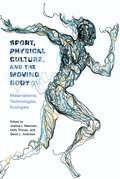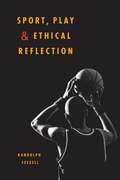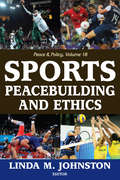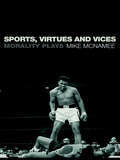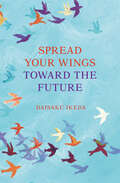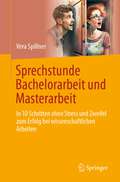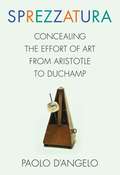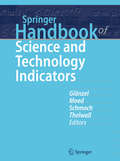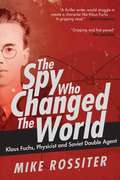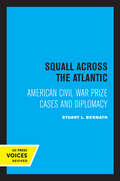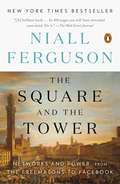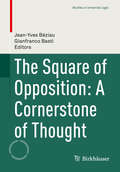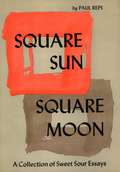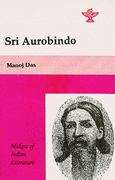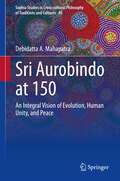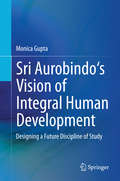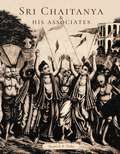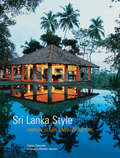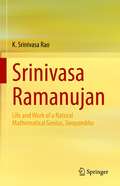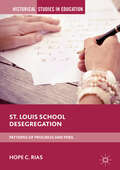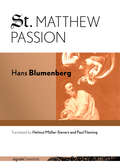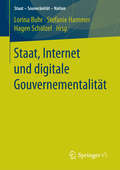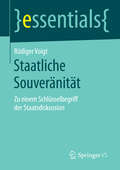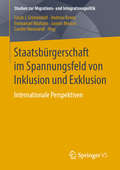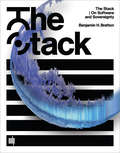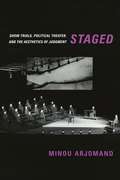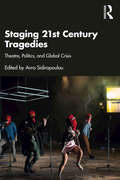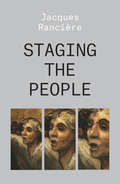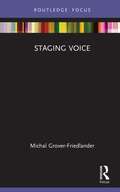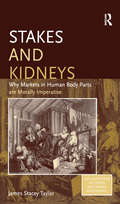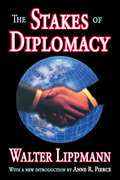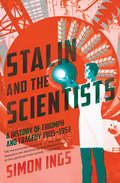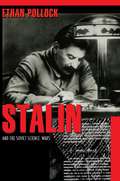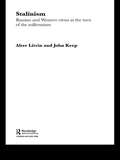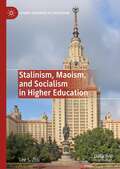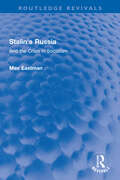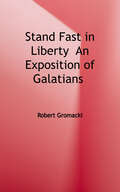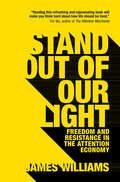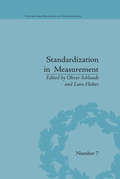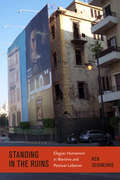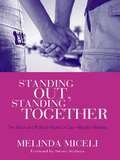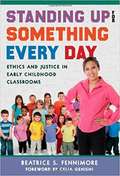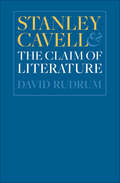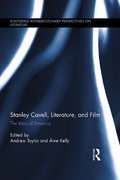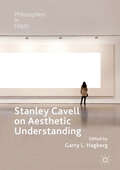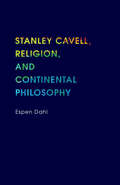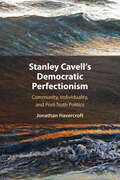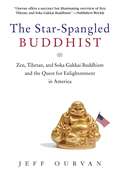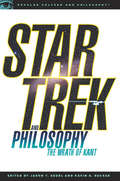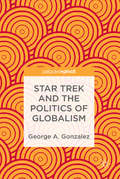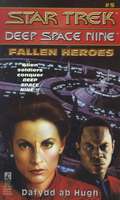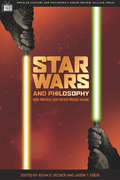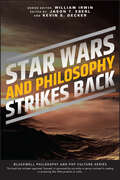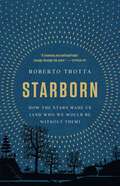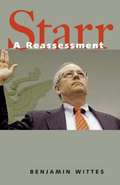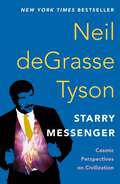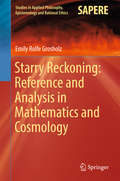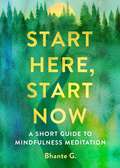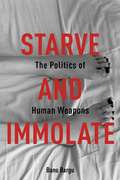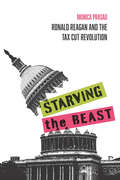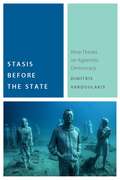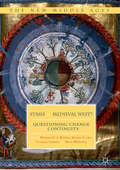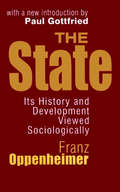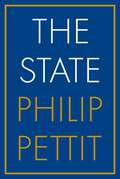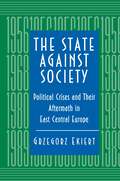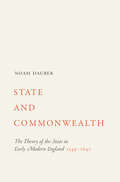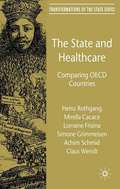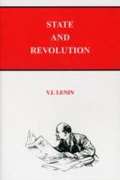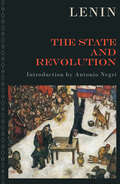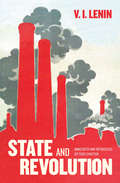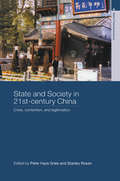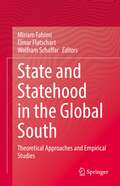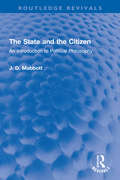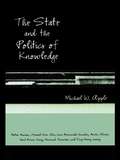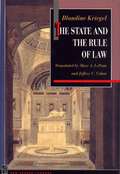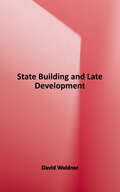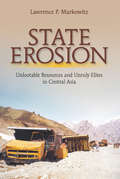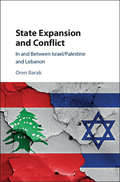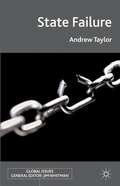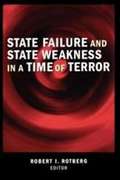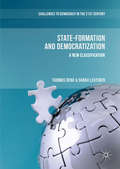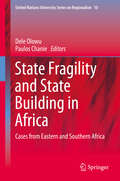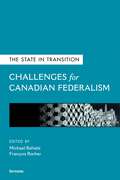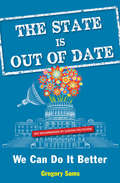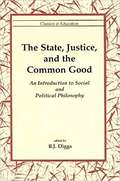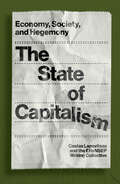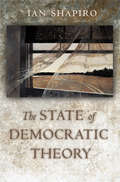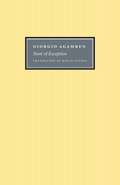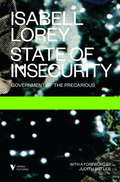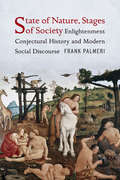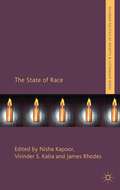- Table View
- List View
Sport, Physical Culture, and the Moving Body: Materialisms, Technologies, Ecologies (Critical Issues in Sport and Society)
by Mary Louise Adams Kiri Baxter Douglas Booth Kyle S Bunds Michael D. Giardina Mariana Clark Simon C Darnell Samantha Frost Simone Fullagar Pirkko Markula Mary G. McDonald Jennifer Sterling Christopher McLeod Matthew G. Hawzen Richard Pringle Oliver Rick Jacob J. Bustad Samantha King Shannon Leigh Jette Katelyn Esmonde David Andrews Carolyn Pluim Gavin WeedonThe moving body—pervasively occupied by fitness activities, intense training and dieting regimes, recreational practices, and high-profile sporting mega-events—holds a vital function in contemporary society. As the body moves—as it performs, sweats, runs, and jumps—it sets in motion an intricate web of scientific rationalities, spatial arrangements, corporate imperatives, and identity politics (i.e. politics of gender, race, social class, etc.). It represents vitality in its productive and physiological capacities, it drives a complex economy of experiences and products, and it is a meaningful site of cultural identities and politics. Contributors to Sport, Physical Culture, and the Moving Body work from a simple premise: as it moves, the material body matters. Adding to the burgeoning fields of sport studies and body studies, the works featured here draw upon the traditions of feminist theory, posthumanism, actor network theory, and new materialism to reposition the physical, moving body as crucial to the cultural, political, environmental, and economic systems that it constitutes and within which is constituted. Once assembled, the book presents a study of bodies in motion—made to move in contexts where technique, performance, speed, strength, and vitality not only define the conduct therein, but provide the very reason for the body’s being within those economies and environments. In so doing, the contributors look to how the body moving for and about rational systems of science, medicine, markets, and geopolity shapes the social and material world in important and unexpected ways. In Sport, Physical Culture, and the Moving Body, contributors explore the extent to which the body, when moving about both ostensibly active body spaces (i.e., the gymnasium, the ball field, exercise laboratory, the track or running trail, the beach, or the sport stadium) and those places less often connected to physical activity (i.e. the home, the street, the classroom, the automobile), is bounded to technologies of life and living; and to the political arrangements that seek to capitalize upon such frames of biological vitality. To do so, the authors problematize the rise of active body science (i.e. kinesiology, sport and exercise sciences, performance biotechnology) and the effects these scientific interventions have on embodied, lived experience. Contributors to Sport, Physical Culture, and the Moving Body will be engaging a range of new and emerging theoretical perspectives, including new materialist, political ecology, developmental systems theory, and new material feminist approaches, to examine the actors and assemblages of movement-based material, political, and economic production. In so doing, contributors will vividly and powerfully illustrate the extent to which a focus on the fleshed body and its material conditions can bring forth new insights or ontological and epistemological innovation to the sociology of sport and physical activity. They will also explore the agency of the body as and amongst things. Such a performative materialist approach explicates how complex assemblages of sport and physical activity—bringing into association everything from muscle fibers and dietary proteins to stadium concrete or regional aquifers—are not only meaningful, but ecological. By focusing on the confluence of agentive materialities, disciplinary technologies, vibrant assemblages, speculative realities, and vital performativities, Sport, Physical Culture, and the Moving Body promises to offer a groundbreaking departure from representationalist tendencies and orthodoxies brought about by the cultural turn in sport and physical cultural studies. It brings the moving body and its physics back into focus: recentering moving flesh and bones as locus of social order, environmental change, and the global political economy.
Sport, Play, and Ethical Reflection
by Randolph FeezellIn paperback for the first time, Randolph Feezell's Sport, Play, and Ethical Reflection immediately tackles two big questions about sport: "What is it?" and "Why does it attract so many people?" Feezell argues that sports participation is best described as a form of human play, and the attraction for participants and viewers alike derives from both its aesthetic richness and narrative structure. He then claims that the way in which sports encourage serious competition in trivial pursuits is fundamentally absurd, and therefore participation requires a state of irony in the participants, where seriousness and playfulness are combined. Feezell builds on these conclusions, addressing important ethical issues, arguing that sportsmanship should be seen as a kind of Aristotelian mean between the extremes of over- and under-investment in sport. Chapters on cheating, running up the score, and character building stress sport as a rule-governed, tradition-bound practice with standards of excellence and goods internal to the practice. With clear writing and numerous illuminating examples, Feezell demonstrates deep insight into both of his subjects.
Sports, Peacebuilding and Ethics (Peace And Policy Ser.)
by Linda M. JohnstonAs this latest volume in the Peace & Policy series shows, sports can be an effective mechanism for peacebuilding, especially when incorporated into conflict-resolution programs. Such programs have been designed to bring children together in post-conflict situations with an ultimate goal of reducing future violence. In examining such programs, the volume's contributors ask key questions: "What are the programs achieving?" and "How are they measuring success?" Although such programs have by and large been successful, some issues need to be addressed if these programs are to hone their effectiveness.Among the questions explored in the volume are: various aspects of culture and how they can help shape sports programs; the role of a coach in creating a culture of peace, and how this culture can fit into a peacebuilding process. Contributors also examine the role of sports in trauma relief programs in Rwanda; the role of universities in sports; and the role of sports in the demilitarization of child soldiers.The last three contributors tackle some of the legitimate concerns raised about using sports for peacebuilding, such as sports being competitive, violent, and focused on winning. Contributors look carefully at these and other issues that have arisen in sports as a tool of conflict resolution, discuss why they have become concerns, and consider some possible ways to deal with these concerns in the future.
Sports, Virtues and Vices: Morality Plays
by Mike McNameeSports have long played an important role in society. By exploring the evolving link between sporting behaviour and the prevailing ethics of the time this comprehensive and wide-ranging study illuminates our understanding of the wider social significance of sport. The primary aim of Sports, Virtues and Vices is to situate ethics at the heart of sports via ‘virtue ethical’ considerations that can be traced back to the gymnasia of ancient Greece. The central theme running through the book is that sports are effectively modern morality plays: universal practices of moral education for the masses and - when coached, officiated and played properly - a valuable vehicle for ethical development. Including a wealth of contemporary sporting examples, the book explores key ethical issues such as: How the pursuit of sporting excellence can lead to harm Doping, greed and shame Biomedical technology as a challenge to the virtue of elite athletes Defining a ‘virtue ethical account’ in sport Family vices and virtues in sport Written by one of the world's foremost sports philosophers, this book powerfully unites the fields of sports ethics and medical ethics. It is essential reading for all students and scholars with an interest in the ethics and philosophy of sport.
Spread Your Wings Toward the Future
by Daisaku IkedaDaisaku Ikeda has spent a lifetime traveling for peace around the world. In these essays about countries from Canada and Chile to Russia and Spain to Thailand and India, you'll learn about the places he's been, the people he's met, and the wisdom he's learned. Most of all you'll be inspired to take flight on your own wings and soar into the future.
Sprechstunde Bachelorarbeit und Masterarbeit: In 10 Schritten ohne Stress und Zweifel zum Erfolg bei wissenschaftlichen Arbeiten
by Vera SpillnerDieses Buch hilft Dir, Deine Bachelor- oder Masterarbeit erfolgreich und stressfrei zu erstellen. Von der Idee zur fertigen Arbeit werden schrittweise alle Etappen des wissenschaftlichen Arbeitens aufgezeigt und gemeinsam mit Dir eingeübt, um Deine Arbeit auf den richtigen Weg zu bringen. Die Abschlussarbeit im Studium ist kein Sprint, sondern ein Marathon. Vera Spillner zeigt Dir, wie Du diese Langstrecke bewältigst, wie Du die einzelnen Etappen planst, die wissenschaftlichen Anforderungen richtig erfüllst und Dich motivierst, wenn es mal schwierig wird. Als Betreuerin von Abschlussarbeiten hat die Autorin vielfach erlebt, dass ein systematisches Vorgehen plus eine positive Einstellung der Schlüssel zum Erfolg ist. Genau diesen Schlüssel hältst Du nun mit diesem Buch in den Händen. In dieser Sprechstunde werden Fragen, Schritte und Stolperfallen des wissenschaftlichen Arbeitens systematisch aufgearbeitet: Wie finde ich ein Thema, das auf meinen Interessen abgestimmt ist? Wie entwickle ich eine machbare und relevante Forschungsfrage? Welche Methode wende ich hierfür an? Wie schreibe ich ein Exposé, wie eine Einleitung? Was muss alles in die Gliederung? Wie finde ich einen Erst- und Zweitbetreuer? Wie viel Zeit sollte ich für meine Abschlussarbeit einplanen? Wie sieht wissenschaftliches Arbeiten aus? Was muss ich während der Schreibphase alles beachten? Was muss ich bei der Abgabe alles beachten?Die Autorin bietet für all diese Fragen (und mehr) Tipps, konkrete Vorschläge, Beispiele und gelegentliche Teepausen, um ohne Stress und Zweifel durch die Abschlussarbeit zu kommen.
Sprezzatura: Concealing the Effort of Art from Aristotle to Duchamp (Columbia Themes in Philosophy, Social Criticism, and the Arts)
by Paolo D'AngeloThe essence of art is to conceal art. A dancer or musician does not only need to perform with ability. There should also be a lack of visible effort that gives an impression of naturalness. To disguise technique and feign ease is to heighten beauty. To express this notion, Italian has a word with no exact equivalent in other languages, sprezzatura: a kind of unaffectedness or nonchalance.In this book, the first to consider sprezzatura in its own right, philosopher of art Paolo D’Angelo reconstructs the history of concealing art, from ancient rhetoric to our own times. The word sprezzatura was coined in 1528 by Baldassarre Castiglione in The Book of the Courtier to mean a kind of grace with a special essence: the ability to conceal art. But the idea reaches back to Aristotle and Cicero and forward to avant-garde works such as Duchamp’s ready-mades, all of which share the suspicion of the overt display of skill. The precept that art must be hidden turns up in a number of fields, from cosmetics to interior design, politics to poetry, the English garden to shabby chic. Through exploring different articulations of this idea, D’Angelo shows the paradox of aesthetics: art hides that it is art, but in doing so it reveals itself to be art and becomes an assertion about art. When art is concealed, it appears as spontaneous as nature—yet, paradoxically, also reveals its indebtedness to technique. An erudite and surprising tour through aesthetics, philosophy, and art history, Sprezzatura presents a strikingly original argument with deceptive ease.
Springer Handbook of Science and Technology Indicators (Springer Handbooks)
by Wolfgang Glänzel Henk F. Moed Ulrich Schmoch Mike ThelwallThis handbook presents the state of the art of quantitative methods and models to understand and assess the science and technology system. Focusing on various aspects of the development and application of indicators derived from data on scholarly publications, patents and electronic communications, the individual chapters, written by leading experts, discuss theoretical and methodological issues, illustrate applications, highlight their policy context and relevance, and point to future research directions.A substantial portion of the book is dedicated to detailed descriptions and analyses of data sources, presenting both traditional and advanced approaches. It addresses the main bibliographic metrics and indexes, such as the journal impact factor and the h-index, as well as altmetric and webometric indicators and science mapping techniques on different levels of aggregation and in the context of their value for the assessment of research performance as well as their impact on research policy and society. It also presents and critically discusses various national research evaluation systems.Complementing the sections reflecting on the science system, the technology section includes multiple chapters that explain different aspects of patent statistics, patent classification and database search methods to retrieve patent-related information. In addition, it examines the relevance of trademarks and standards as additional technological indicators.The Springer Handbook of Science and Technology Indicators is an invaluable resource for practitioners, scientists and policy makers wanting a systematic and thorough analysis of the potential and limitations of the various approaches to assess research and research performance.
The Spy Who Changed the World: Klaus Fuchs, Physicist and Soviet Double Agent
by Mike RossiterThe incredible true story of a British physicist who was an undercover spy for the Soviets. The world first heard of Klaus Fuchs, the head of theoretical physics at the British Research Establishment at Harwell in February 1950 when he appeared at the Old Bailey, accused of passing secrets to the Soviet Union. For over sixty years disinformation and lies surrounded the story of Klaus Fuchs as the Governments of Britain, the United States and Russia all tried to cover up the truth about his treachery. Piecing together the story from archives in Britain, the United States, Russia and Germany, The Spy Who Changed the World unravels the truth about Fuchs and reveals for the first time his long career of espionage. It proves that he played a pivotal role in Britain's bomb program in the race to keep up with the United States in the atomic age, and that he revealed vital secrets about the atom bomb, as well as the immensely destructive hydrogen bomb to the Soviet Government. It is a dramatic tale of clandestine meetings, deadly secrets, family entanglements and illicit love affairs, all set against the tumultuous years from the rise of Hitler to the start of the Cold War.
Squall Across the Atlantic: American Civil War Prize Cases and Diplomacy
by Stuart L. BernathThis title is part of UC Press's Voices Revived program, which commemorates University of California Press’s mission to seek out and cultivate the brightest minds and give them voice, reach, and impact. Drawing on a backlist dating to 1893, Voices Revived makes high-quality, peer-reviewed scholarship accessible once again using print-on-demand technology. This title was originally published in 1970.
The Square and the Tower: Networks and Power, from the Freemasons to Facebook
by Niall Ferguson<P>Most history is hierarchical- it's about popes, presidents, and prime ministers. But what if that's simply because they create the historical archives? What if we are missing equally powerful but less visible networks - leaving them to the conspiracy theorists, with their dreams of all-powerful Illuminati? The twenty-first century has been hailed as the Networked Age. But in The Square and the Tower, Niall Ferguson argues that social networks are nothing new. <P>From the printers and preachers who made the Reformation to the freemasons who led the American Revolution, it was the networkers who disrupted the old order of popes and kings. Far from being novel, our era is the Second Networked Age, with the computer in the role of the printing press. But networks have a dark side, prone to clustering, contagions, and even outages. And the conflicts of the past already have unnerving parallels today, in the time of Facebook, Islamic State and Trumpworld. <P><b>A New York Times Bestseller</b>
The Square of Opposition: A Cornerstone of Thought
by Jean-Yves Béziau Gianfranco BastiThis is a collection of new investigations and discoveries on the theory of opposition (square, hexagon, octagon, polyhedra of opposition) by the best specialists from all over the world. The papers range from historical considerations to new mathematical developments of the theory of opposition including applications to theology, theory of argumentation and metalogic.
Square Sun Square Moon: A Collection of Sweet Sour Essays
by Paul RepsThis collection of Zen essays by the author of Zen Flesh, Zen Bones offers an enlightening perspective on a variety of topics.From the introduction:Not all of us can be exuberant travelers though we all dream of faraway places. <P><P>Not all of us can sec the subliminal with a penetrating eye, though many of us yearn to shake off the philistine shells that restrict our lives to the prosaic.Here, then, is your chance! In the privacy of your den, on the commode, in the library wherever you find reading most pleasurable reps invites you t o share his experiences vicariously. Within these pages, if you synchronize properly, you may find yourself in Tahiti where you "breathe this flowered air, drink the cascading water, cat the fruits and just sleep" until "you too become sweet."
Squaring the Circle in Descartes' Meditations
by Stephen I. WagnerDescartes' Meditations is one of the most thoroughly analyzed of all philosophical texts. Nevertheless, central issues in Descartes' thought remain unresolved, particularly the problem of the Cartesian Circle. Most attempts to deal with that problem have weakened the force of Descartes' own doubts or weakened the goals he was seeking. In this book, Stephen I. Wagner gives Descartes' doubts their strongest force and shows how he overcomes those doubts, establishing with metaphysical certainty the existence of a non-deceiving God and the truth of his clear and distinct perceptions. Wagner's innovative and thorough reading of the text clarifies a wide range of other issues that have been left unclear by previous commentaries, including the nature of the cogito discovery and the relationship between Descartes' proofs of God's existence. His book will be of great interest to scholars and upper-level students of Descartes, early modern philosophy and theology.
Sri Aurobindo at 150: An Integral Vision of Evolution, Human Unity, and Peace (Sophia Studies in Cross-cultural Philosophy of Traditions and Cultures #40)
by Debidatta A. MahapatraThis book brings to focus one of the prominent 20th century Indian thinkers, Sri Aurobindo, by providing an overview of his philosophy on life and yoga, and by elucidating his thought in the context of contemporary society. This text is unique in approaching Sri Aurobindo as a problem solver and from a conflict resolution perspective, the latter being the author’s expertise. Sri Aurobindo’s contributions such as Ideal of Human Unity, Integral Yoga, Life Divine and his poetic vision as embodied in his epic poem, Savitri, are explored in-depth. The book explores these ideas to seek possible solutions to the current predicaments of human life and society. This monograph attracts not only students and researchers in the fields of philosophy, religion, yoga, political science, international politics, Indian thought, and conflict resolution, but also general interest readers.
Sri Aurobindo's Vision of Integral Human Development
by Monica GuptaThis book explores the integral vision of human development contained in the original works of Sri Aurobindo and The Mother. It delves into multiple layers of the human personality as envisaged by Sri Aurobindo and The Mother and explores a new developmental science of consciousness based on the practice of Integral Yoga. The book examines the major metatheoretical conceptions that shape the contemporary discipline of developmental psychology and discusses the ways in which Sri Aurobindo's philosophical and psychological perspective can help break fresh ground for developmental theorisation and research by extending the current understanding of the human evolutionary potential. The author proposes a new agenda for human development which brings together the key ideas of integral individual and collective development and informs practices in the areas of counselling, education, parenting and self-development. This book will be of special interest for researchers of developmental psychology, human development, counselling psychology, philosophy, social work and education.
Sri Chaitanya & His Associates
by Swami B. B. Tirtha Maharaja"In this jewel-like volume, the venerable Tirtha Maharaja recounts the nectarean activities of the associates of Lord Gauranga and the acharyas of the Gaudiya Vaishnava religion." ––Swami B.P. Puri, Founder Acharya, Gopinath Gaudiya MathSrila Bhakti Ballabha Tirtha Goswami Maharaja has gathered a great deal of information about the lives of the devotees from numerous sources, and has made this information more relishable by virtue of his own insight. These biographies of Mahaprabhu's devotees should be read on their appearance and disappearance days, for this will bring great joy to both those who hear and those who read them. In this English translation, it will be possible for devotees around the world to enjoy them. Herein, the author delights in the life stories of Jagannath Mishra, Madhavendra Puri, Ishvara Puri, Advaita Acharya, Srivas Pandit, Chandrasekhar Acharya, Pundarika Vidyanidhi, Gadadhar Pandit, Vakresvara Pandit, Gadadhar Das, Shivananda Sen, Paramananda Puri, Murari Gupta, and many others. Every letter of these accounts is drenched with the nectar of devotion. The sincere seeker will never be able to enter the transcendental kingdom nor to advance in the devotional life unless they also discover this delight.
Sri Lanka Style
by Channa Daswatte Dominic SansoniSri Lanka Style showcases over 30 of the finest traditional and modern dwellings in Sri Lanka, from private homes to retreats and resorts, all designed by the island's most creative architects and interior designers including some by the world-renowned architect Geoffrey Bawa that have never been seen before. These houses demonstrate the essentials of the Sri Lankan lifestyle-spaces open to the environment and the natural use of space and decor-and contribute to a palpable sense of peace and discipline. In addition, there are practical design ideas that can be applied to any tropical locale.
Srinivasa Ramanujan: Life and Work of a Natural Mathematical Genius, Swayambhu
by K. Srinivasa RaoThis book offers a unique account on the life and works of Srinivasa Ramanujan—often hailed as the greatest “natural” mathematical genius. Sharing valuable insights into the many stages of Ramanujan’s life, this book provides glimpses into his prolific research on highly composite numbers, partitions, continued fractions, mock theta functions, arithmetic, and hypergeometric functions which led the author to discover a new summation theorem. It also includes the list of Ramanujan’s collected papers, letters and other material present at the Wren Library, Trinity College in Cambridge, UK. This book is a valuable resource for all readers interested in Ramanujan’s life, work and indelible contributions to mathematics.
St. Louis School Desegregation: Patterns of Progress and Peril (Historical Studies in Education)
by Hope C. RiasThis book examines the history of the school desegregation movement in St. Louis, Missouri. Underlining the 2014 killing of Michael Brown as a catalyst for re-examination of school desegregation, Rias delves into the connection between contemporary school segregation and social justice, probing the ways that “soft racism”—a term the author uses to describe the non-violent, yet equally harmful, types of protests that opponents of desegregation utilized—has permeated St. Louis since the days of Brown v. Board of Education. The chapters feature the voices of those who were central to the desegregation fight in St. Louis, showing how the devastating effects of school segregation and soft racism linger today.
St. Matthew Passion (signale|TRANSFER: German Thought in Translation)
by Hans BlumenbergSt. Matthew Passion is Hans Blumenberg's sustained and devastating meditation on Jesus's anguished cry on the cross, "My God, my God, why have you forsaken me?" Why did this abandonment happen, what does it mean within the logic of the Gospels, how have believers and nonbelievers understood it, and how does it live on in art? With rare philological acuity and vast historical learning, Blumenberg unfolds context upon context in which this cry has reverberated, from early Christian apologetics and heretics to twentieth-century literature and philosophy. Blumenberg's guide through this unending story of divine abandonment is Johann Sebastian Bach's monumental Matthäuspassion, the parabolic mirror that bundled eighteen hundred years of reflection on the fate of the crucified and the only available medium that allows us post-Christian listeners to feel the anguish of those who witnessed the events of the Passion. With interspersed references to writers such as Goethe, Rilke, Kafka, Freud, and Benjamin, Blumenberg gathers evidence to raise the singular question that, in his view, Christian theology has not been able to answer: How can an omnipotent God be so offended by his creatures that he must sacrifice and abandon his own Son?
Staat, Internet und digitale Gouvernementalität
by Lorina Buhr Stefanie Hammer Hagen SchölzelDer Sammelband trägt theoriebildende und empirische Forschungsansätze, sowie neue Erkenntnisse zu einem in den sozialwissenschaftlichen Betrachtungen bisher wenig bearbeiteten Forschungsfeld – den vielschichtigen Beziehungen zwischen Staat, Internet, Regierungsrationalitäten und Regierungstechniken – zusammen. Um neue Impulse für eine intensivere inter- und transdisziplinäre Diskussion zu setzen, verfolgt die Publikation das Anliegen, die Vernetzung und den wissenschaftlichen Austausch der in diesem Feld aktiven (Nachwuchs-)Forscher zu initiieren bzw. zu vertiefen, sowie den bisher erarbeiteten Wissensstand zusammenzutragen und einer interessierten Fachöffentlichkeit zugänglich zu machen. Die Beiträge widmen sich einem Bündel an Fragen aus unterschiedlichen Perspektiven: Was macht das digital-binäre System und die Digitalität mit dem Staat, mit Staatlichkeiten, mit Regierungsweisen und Regierungsformen? Wie interagieren und konvergieren digitale Technologien und Regierungstechnologien? Wie lässt sich diese Phänomenlage konzeptionell sowohl von der politischen Theorie und Soziologie als auch von einer politisch orientierten Medien(kultur)wissenschaft einholen?
Staatliche Entwicklungszusammenarbeit in Deutschland: Eine Bestandsaufnahme des BMZ 1961-2021 ((Re-)konstruktionen - Internationale und Globale Studien)
by Wolfgang Gieler Meik NowakSeit der Gründung des Bundesministeriums für wirtschaftliche Zusammenarbeit und Entwicklung (BMZ) am 14. November 1961 wurde es von 13 Minister*innen geleitet. Die deutsche staatliche Entwicklungszusammenarbeit (EZ) der vergangenen 60 Jahre wurde von diesen Persönlichkeiten unterschiedlicher biographischer Herkunft und parteipolitischer Zugehörigkeit aufgebaut, weiterentwickelt und mitunter entscheidend geprägt. Die Beiträge dieses Bandes bieten einen fundierten Überblick über die Biographie aller Minister*innen, stellen ihre spezifischen entwicklungspolitischen Konzeptionen dar und analysieren deren Verwirklichung und Bewährung. In einer abschließenden Würdigung wird jeweils der Versuch unternommen, den individuellen Einfluss auf die nationale und internationale Entwicklungspolitik zu bestimmen. Ergänzt werden die ministeriellen Porträts um die institutionelle Rolle des BMZ – von der Entwicklungshilfe über Entwicklungspolitik bis zur Entwicklungszusammenarbeit in zeithistorischer Perspektive. Abgerundet wird dieses Grundlagenwerk mit umfangreichen Daten und Fakten zur staatlichen deutschen EZ.
Staatliche Souveränität: Zu einem Schlüsselbegriff der Staatsdiskussion (essentials)
by Rüdiger VoigtDas essential erläutert zunächst die Begriffsgeschichte und Bedeutung der Souveränität für den Staat des 21. Jahrhunderts und beschreibt die drei Typen Parlamentssouveränität, Rechts- bzw. Verfassungssouveränität sowie (direkte) Volkssouveränität. Anschließend analysiert der Autor den Begriff der nationalstaatlichen Souveränität im Kontext der Globalisierung, Internationalisierung sowie Europäisierung und stellt die Auswirkungen des globalen Finanzkapitalismus auf die nationalstaatliche Souveränität dar. Die Übertragung von Kernkompetenzen an die Europäische Union bei gleichzeitigem Souveränitätsverlust der Mitgliedstaaten und die Kontroverse zwischen Universalisten, Nationalisten und Partikularisten werden kritisch diskutiert. Abschließend liefert das essential Ansatzpunkte zu einer Erneuerung der Volkssouveränität im demokratischen Rechtsstaat.
Staatsbürgerschaft im Spannungsfeld von Inklusion und Exklusion: Internationale Perspektiven (Studien zur Migrations- und Integrationspolitik)
by Sarah J. Grünendahl Andreas Kewes Emmanuel Ndahayo Jasmin Mouissi Carolin NieswandtStaatsbürgerschaft gilt in soziologischer Theorie und politischer Praxis als Ausdruck gesellschaftlicher Zugehörigkeit und politischer Teilhabe. Der Band lädt dazu ein, sich dem Konzept der Staatsbürgerschaft als einem wandelbaren und spannungsreichen Konzept zu nähern. Einerseits zeigen die Beiträge, wie die Ergänzung und praktische Inanspruchnahme von (Staats-)Bürgerschaft auf lokaler Ebene und in zivilgesellschaftlichen Kontexten geschieht. Andererseits gerät auch die exklusive Wirkung von Staatsbürgerschaft in gesellschaftlichen Aushandlungen, rechtlicher Praxis und (Bildungs-) Politiken in den Blick.
Staatsbürgerschaft neu definiert: Wie die Ausweitung des Wahlrechts auf Einwanderer weltweit debattiert wird (Studien zur Migrations- und Integrationspolitik)
by Luicy PedrozaErweiterungen des Stimmrechts betreffen auch die Frage, wer an der Selbstbestimmung der Gemeinschaft teilnehmen darf. Durch einen umfassenden Vergleich von über 50 Fällen von Wahlrechtserweiterungen an Nicht-Staatsangehörige auf der ganzen Welt bietet dieses Buch eine breite empirische Basis, um diese Reformen zu rekonstruieren und erklärt gleichzeitig, wie Staatsbürgerschaft verstanden wird. Durch mehrere Vergleichsmethoden widerlegt die Autorin die Idee, dass manche Länder eine bestimmte „ethnische“ und andere eine „liberale“ Staatbürgerschaftskultur haben, die alle damit verbundenen Fragen determiniert. Vielmehr reflektieren die Debatten, wie Entscheidungsträger in einem dynamischen politischen Kontext ihre Reformvorschläge sowohl mittels auf Grundlage historischer Bedingungen als auch zeitgenössischer politischer Haltungen gestalten.
The Stack: On Software and Sovereignty (Software Studies)
by Benjamin H. BrattonA comprehensive political and design theory of planetary-scale computation proposing that The Stack—an accidental megastructure—is both a technological apparatus and a model for a new geopolitical architecture. What has planetary-scale computation done to our geopolitical realities? It takes different forms at different scales—from energy and mineral sourcing and subterranean cloud infrastructure to urban software and massive universal addressing systems; from interfaces drawn by the augmentation of the hand and eye to users identified by self—quantification and the arrival of legions of sensors, algorithms, and robots. Together, how do these distort and deform modern political geographies and produce new territories in their own image? In The Stack, Benjamin Bratton proposes that these different genres of computation—smart grids, cloud platforms, mobile apps, smart cities, the Internet of Things, automation—can be seen not as so many species evolving on their own, but as forming a coherent whole: an accidental megastructure called The Stack that is both a computational apparatus and a new governing architecture. We are inside The Stack and it is inside of us. In an account that is both theoretical and technical, drawing on political philosophy, architectural theory, and software studies, Bratton explores six layers of The Stack: Earth, Cloud, City, Address, Interface, User. Each is mapped on its own terms and understood as a component within the larger whole built from hard and soft systems intermingling—not only computational forms but also social, human, and physical forces. This model, informed by the logic of the multilayered structure of protocol “stacks,” in which network technologies operate within a modular and vertical order, offers a comprehensive image of our emerging infrastructure and a platform for its ongoing reinvention. The Stack is an interdisciplinary design brief for a new geopolitics that works with and for planetary-scale computation. Interweaving the continental, urban, and perceptual scales, it shows how we can better build, dwell within, communicate with, and govern our worlds.thestack.org
Staged: Show Trials, Political Theater, and the Aesthetics of Judgment
by Minou ArjomandTheater requires artifice, justice demands truth. Are these demands as irreconcilable as the pejorative term “show trials” suggests? After the Second World War, canonical directors and playwrights sought to claim a new public role for theater by restaging the era’s great trials as shows. The Nuremberg trials, the Eichmann trial, and the Auschwitz trials were all performed multiple times, first in courts and then in theaters. Does justice require both courtrooms and stages?In Staged, Minou Arjomand draws on a rich archive of postwar German and American rehearsals and performances to reveal how theater can become a place for forms of storytelling and judgment that are inadmissible in a court of law but indispensable for public life. She unveils the affinities between dramatists like Bertolt Brecht, Erwin Piscator, and Peter Weiss and philosophers such as Hannah Arendt and Walter Benjamin, showing how they responded to the rise of fascism with a new politics of performance. Linking performance with theories of aesthetics, history, and politics, Arjomand argues that it is not subject matter that makes theater political but rather the act of judging a performance in the company of others. Staged weaves together theater history and political philosophy into a powerful and timely case for the importance of theaters as public institutions.
Staging 21st Century Tragedies: Theatre, Politics, and Global Crisis
by Avra SidiropoulouStaging 21st Century Tragedies: Theatre, Politics, and Global Crisis is an international collection of essays by leading academics, artists, writers, and curators examining ways in which the global tragedies of our century are being negotiated in current theatre practice. In exploring the tragic in the fields of history and theory of theatre, the book approaches crisis through an understanding of the existential and political aspect of the tragic condition. Using an interdisciplinary perspective, it showcases theatre texts and productions that enter the public sphere, manifesting notably participatory, immersive, and documentary modes of expression to form a theatre of modern tragedy. The coexistence of scholarly essays with manifesto-like provocations, interviews, original plays, and diaries by theatre artists provides a rich and multifocal lens that allows readers to approach twenty-first-century theatre through historical and critical study, text and performance analysis, and creative processes. Of special value is the global scope of the collection, embracing forms of crisis theatre in many geographically diverse regions of both the East and the West. Staging 21st Century Tragedies: Theatre, Politics, and Global Crisis will be of use and interest to academics and students of political theatre, applied theatre, theatre history, and theatre theory.
Staging the People: The Proletarian and His Double
by David Fernbach Jacques RanciereThese essays from the 1970s mark the inception of the distinctive project that Jacques Rancière has pursued across forty years, with four interwoven themes: the study of working-class identity, of its philosophical interpretation, of "heretical" knowledge and of the relationship between work and leisure. For the short-lived journal Les Révoltes Logiques, Rancière wrote on subjects ranging across a hundred years, from the California Gold Rush to trade-union collaboration with fascism, from early feminism to the "dictatorship of the proletariat," from the respectability of the Paris Exposition to the disrespectable carousing outside the Paris gates. Rancière characteristically combines telling historical detail with deep insight into the development of the popular mind. In a new preface, he explains why such "rude words" as "people," "factory," "proletarians" and "revolution" still need to be spoken.
Staging Voice (Routledge Voice Studies)
by Michal Grover-FriedlanderStaging Voice is a unique approach to the aesthetics of voice and its staging in performance. This study reflects on what it would mean to take opera’s decisive attribute—voice—as the foundation of its staged performance. The book thinks of staging through the medium of voice. It is a nuances exploration, which brings together scholarly and directorial interpretations, and engages in detail with less frequently performed works of major and influential 20th-century artists—Erik Satie, Bertolt Brecht and Kurt Weill—as well as exposes readers to an innovative experimental work of Evelyn Ficarra and Valerie Whittington. The study is intertwined throughout with the author’s staging of the works accessible online. This book will be of great interest to students and scholars in voice studies, opera, music theatre, musicology, directing, performance studies, practice-based research, theatre, visual art, stage design, and cultural studies.
Stakes and Kidneys: Why Markets in Human Body Parts are Morally Imperative (Live Questions in Ethics and Moral Philosophy)
by James Stacey TaylorIt is well known that the numbers of organs that become available each year for transplantation fall far short of the numbers that are actually required. In this boldly argued book James Stacey Taylor contends that, given both this shortage and the desperate poverty that some people endure, it is morally imperative that the current methods of organ procurement be supplemented by a legal, regulated market for human transplant organs purchased from live vendors. Taylor pays particular attention to outlining the implications that recognizing the moral legitimacy of these market transactions in human body parts and reproductive capacities have for public policy.
The Stakes of Diplomacy
by Walter LippmannWalter Lippmann is arguably the most influential journalist in American history. From the time of Woodrow Wilson to the time of Lyndon Johnson, what Walter Lippmann said mattered. His word was valued because of his exceptional capacity for analysis, and because he had the rare ability to make complex ideas and problems manageable and understandable. Lippmann combined the practical and the theoretical and saw them as inseparable. He savored the life of the mind and relished the arena of politics. He was political philosopher, social commentator, political advisor, and activist-intellectual. As the country grappled with an impressive influx of European ideas and with the threatening press of European problems, so did Lippmann. Like President Wilson, he came to believe that the condition of the modern world required that America either act or be acted upon. New methods of communication and propaganda meant that ideas contrary to America's would be widely heard. Reformed liberalism and the projection of that liberalism into a troubled world were the best hedge against totalitarian schemes and imperialist aggression. The Stakes of Diplomacy resulted from Lippmann's assignment by Wilson's Secretary of War Baker, to a project for studying possible terms of peace and ways to influence the world in a liberal-democratic direction. The Stakes of Diplomacy ends both with admiration for the peaceful nature of democracies and a plea for their further influence in the world, and with an understanding that democracy's influence will depend partly upon its physical might and geopolitical collaboration. Lippmann stands as a prominent figure in America's twentieth-century quest for power with honor. He concludes this volume with the warning that there is no safe way and no morally feasible way to turn back from our dangerous mission: "Unless the people who are humane and sympathetic, the people who wish to live and let live, are masters of the situation, the world faces an indefinite vista of conquest and terror."
Stalin and the Scientists: A History of Triumph and Tragedy, 1905–1953
by Simon Ings&“One of the finest, most gripping surveys of the history of Russian science in the twentieth century.&” —Douglas Smith, author of Former People: The Final Days of the Russian Aristocracy Stalin and the Scientists tells the story of the many gifted scientists who worked in Russia from the years leading up to the revolution through the death of the &“Great Scientist&” himself, Joseph Stalin. It weaves together the stories of scientists, politicians, and ideologues into an intimate and sometimes horrifying portrait of a state determined to remake the world. They often wreaked great harm. Stalin was himself an amateur botanist, and by falling under the sway of dangerous charlatans like Trofim Lysenko (who denied the existence of genes), and by relying on antiquated ideas of biology, he not only destroyed the lives of hundreds of brilliant scientists, he caused the death of millions through famine. But from atomic physics to management theory, and from radiation biology to neuroscience and psychology, these Soviet experts also made breakthroughs that forever changed agriculture, education, and medicine. A masterful book that deepens our understanding of Russian history, Stalin and the Scientists is a great achievement of research and storytelling, and a gripping look at what happens when science falls prey to politics. Longlisted for the Baillie Gifford Prize for Non-Fiction in 2016 A New York Times Book Review &“Paperback Row&” selection &“Ings&’s research is impressive and his exposition of the science is lucid . . . Filled with priceless nuggets and a cast of frauds, crackpots and tyrants, this is a lively and interesting book, and utterly relevant today.&” —The New York Times Book Review &“A must read for understanding how the ideas of scientific knowledge and technology were distorted and subverted for decades across the Soviet Union.&” —The Washington Post
Stalin and the Soviet Science Wars
by Ethan PollockBetween 1945 and 1953, while the Soviet Union confronted postwar reconstruction and Cold War crises, its unchallenged leader Joseph Stalin carved out time to study scientific disputes and dictate academic solutions. He spearheaded a discussion of "scientific" Marxist-Leninist philosophy, edited reports on genetics and physiology, adjudicated controversies about modern physics, and wrote essays on linguistics and political economy. Historians have been tempted to dismiss all this as the megalomaniacal ravings of a dying dictator. But in Stalin and the Soviet Science Wars, Ethan Pollock draws on thousands of previously unexplored archival documents to demonstrate that Stalin was in fact determined to show how scientific truth and Party doctrine reinforced one another. Socialism was supposed to be scientific, and science ideologically correct, and Stalin ostensibly embodied the perfect symbiosis between power and knowledge. Focusing on six major postwar debates in the Soviet scientific community, this elegantly written book shows that Stalin's forays into scholarship can be understood only within the context of international tensions, institutional conflicts, and the growing uncertainty about the proper relationship between scientific knowledge and Party-dictated truths. The nature of Stalin's interventions makes clear that more was at stake than high politics: these science wars were about asserting that the Party was rational and modern, and about codifying the Soviet worldview in a battle for the hearts and minds of people around the globe during the early Cold War. Ultimately, however, the effort to develop a scientific basis for Soviet ideology undermined the system's legitimacy.
Stalin and the Struggle for Supremacy in Eurasia
by Alfred J. RieberThis is a major new study of the successor states that emerged in the wake of the collapse of the great Russian, Habsburg, Iranian, Ottoman and Qing Empires and of the expansionist powers who renewed their struggle over the Eurasian borderlands through to the end of the Second World War. Surveying the great power rivalry between the Soviet Union, Nazi Germany and Imperial Japan for control over the Western and Far Eastern boundaries of Eurasia, Alfred J. Rieber provides a new framework for understanding the evolution of Soviet policy from the Revolution through to the beginning of the Cold War. Paying particular attention to the Soviet Union, the book charts how these powers adopted similar methods to the old ruling elites to expand and consolidate their conquests, ranging from colonisation and deportation to forced assimilation, but applied them with a force that far surpassed the practices of their imperial predecessors.
Stalinism: Russian and Western Views at the Turn of the Millenium (Totalitarianism Movements and Political Religions)
by John L. Keep Alter L. LitvinStalinism surveys the efforts made in recent years by professional historians, in Russia and the West, to better understand what really went on in the USSR between 1929 and 1953, when the country's affairs were shrouded in secrecy. The opening of the Soviet archives in 1991 has led to a profusion of historical studies, whose strengths and weaknesses are assessed here impartially though not uncritically. While Joseph Stalin now emerges as a less omnipotent figure than he seemed to be at the time, most serious writers accept that the system over which he ruled was despotic and totalitarian. Some nostalgic nationalists in Russia, along with some Western post-modernists, disagree. Their arguments are carefully dissected here. Stalinism was of course much more than state sponsored terror, and so due attention is paid to a wide range of socio-economic and cultural problems. Keep and Litvin applaud the efforts of Soviet citizens to express dissenting views.
Stalinism, Maoism, and Socialism in Higher Education (Global Histories of Education)
by Lee S. ZhuThis book is a comparative study of the endeavors to create a socialist system of higher education in the Soviet Union under Stalin and in China under Mao. It is organized around three themes: the convergence of Maoism with Stalinism in the early 1950s, which induced the transnational transplantation of the Soviet model of higher education to China; historical convergence between Stalinism of the First Five-Year Plan period (1928–1932) and Maoism of the Great Leap period (1958–1960), which was prominently manifested in Soviet and Chinese higher education policies in these respective periods; the eventual divergence of Maoism from Stalinism on the definition of socialist society, which was evinced in the different final outcomes of the Maoist and Stalinist endeavors to create a socialist system of higher learning.
Stalin's Russia: And the Crisis in Socialism (Routledge Revivals)
by Max EastmanFirst published in 1940, Stalin’s Russia is a close study of the development of the Stalinist regime and the flaws in socialist doctrine that made it possible. The book examines the contrasts between the "free and equal" society heralded by the Marxist-Leninist programme and the totalitarian state that emerged in its place. It makes use of a wealth of material to cast light on the inner workings of Stalin’s regime. It explores the significance of the Stalin-Hitler pact, and argues that the word "socialism" itself became a liability to any genuine movement of liberation as a result.
Stand Fast in Liberty: An Exposition of Galatians (The Gromacki Expository Series)
by Robert GromackiPastors, teachers, Bible schools and colleges, and study groups will benefit from these fine expositions. Based on the English text (KJV), Dr. Gromacki uses his expertise and gifting to present the meaning of the epistle in a clear and straightforward manner. Necessary technical matters and notes on the Greek are included, but they are confined to the footnotes. These books are divided into thirteen chapters, each of which is followed by challenging discussion questions.
Stand Out of Our Light: Freedom And Resistance In The Attention Economy
by James WilliamsFormer Google advertising strategist, now Oxford-trained philosopher James Williams launches a plea to society and to the tech industry to help ensure that the technology we all carry with us every day does not distract us from pursuing our true goals in life. <P><P>As information becomes ever more plentiful, the resource that is becoming more scarce is our attention. In this 'attention economy', we need to recognise the fundamental impacts of our new information environment on our lives in order to take back control. Drawing on insights ranging from Diogenes to contemporary tech leaders, Williams's thoughtful and impassioned analysis is sure to provoke discussion and debate. Williams is the inaugural winner of the Nine Dots Prize, a new Prize for creative thinking that tackles contemporary social issues. This title is also available as Open Access.<P> Powerfully argues for the reclamation of individual agency and freedom in a world where our attention is vied over by tech companies<P> Presents a combination of technological and philosophical insight into the implications of the burgeoning 'attention economy',<P> Authored by the inaugural winner of the Nine Dots Prize, a new, biannual prize for creative thinking that tackles contemporary social issues. This title is also available as Open Access
Standardization in Measurement: Philosophical, Historical and Sociological Issues (History and Philosophy of Technoscience #7)
by Oliver Schlaudt Lara HuberThe application of standard measurement is a cornerstone of modern science. In this collection of essays, standardization of procedure, units of measurement and the epistemology of standardization are addressed by specialists from sociology, history and the philosophy of science.
Standards of English in Higher Education
by Neil MurrayThe student demographic of universities today has changed quite dramatically from even a decade ago. As universities seek to internationalise, widen participation and derive attendant reputational and financial benefits, along with greater opportunities for research collaborations and industry links, they also face a growing challenge associated with what Neil Murray terms 'the English language question'. In particular, as the proportion of students of non-English speaking backgrounds entering universities increases, there is growing concern over levels of language proficiency and what this can mean for educational standards, the student experience and, ultimately, institutional standing. Standards of English in Higher Education unpacks a number of key and interrelated issues - for example, the assessment of proficiency and the structure and nature of provision - that bear on the question of English language standards and in doing so offers a frank critical appraisal of English language in higher education today.
Standing by the Ruins: Elegiac Humanism in Wartime and Postwar Lebanon
by Ken SeigneurieSince the mid-1970s, Lebanon has been at the center of the worldwide rise in sectarian extremism. Its cultural output has both mediated and resisted this rise. Standing by the Ruins reviews the role of culture in supporting sectarianism, yet argues for the emergence of a distinctive aesthetic of resistance to it. Focusing on contemporary Lebanese fiction, film, and popular culture, this book shows how artists reappropriated the twin legacies of commitment literature and the ancient topos of “standing by the ruins” to form a new “elegiac humanism” during the tumultuous period of 1975 to 2005. It redirects attention to the critical role of culture in conditioning attitudes throughout society and is therefore relevant to other societies facing sectarian extremism. Standing by the Ruins is also a strong intervention in the burgeoning field of World Literature. Elaborating on the great Arabist Hilary Kilpatrick’s crucial insight that ancient Arabic forms and topoi filter into modern literature, the author details how the “standing by the ruins” topos—and the structure of feeling it conditions—has migrated over time. Modern Arabic novels, feature films, and popular culture, far from being simply cultural imports, are hybrid forms deployed to respond to the challenges of contemporary Arab society. As such, they can take their place within a World Literature paradigm: they are cultural products that travel and intervene in the world.
Standing Out, Standing Together: The Social and Political Impact of Gay-Straight Alliances
by Melinda MiceliJust a decade ago, requests by students to establish groups to support gay and lesbian students were rare and generally met with shock and confusion by school administrators and local communities. Today there are more than 1600 gay straight alliances (GSAs) across the country. Standing Out, Standing Together documents the emergence of gay straight alliances in public schools across America - from factors that have contributed to the relatively rapid spread of GSA to those that stirred controversy and posed roadblocks. Using over 10 years of interviews with students, teachers, administrators and political activists; case studies; and local and national media reports, Miceli explores the personal and political stakes involved in the battles over GSAs. Although the book acknowledges and documents the harassment, abuse and problems suffered by many gay, lesbian, transgendered, and bisexual students, its primary focus is on these students as political activists, rather than as passive victims, making it a unique contribution to sociologists, educators, political activists and LGBTreaders alike.
Standing Up for Something Every Day: Ethics and Justice In Early Childhood Classrooms (Early Childhood Education)
by Beatrice S. Fennimore Sharon RyanStanding Up for Something Every Day is written for present and future teachers in the early childhood classroom who truly want to make a difference in the lives of children. Exploring some of the most complex and pressing social and ethical dilemmas confronting early childhood educators, the author provides concrete ways of addressing social justice concerns in practice. Four model teacher-guides accompany readers from chapter to chapter, and demonstrate strategies for standing up for children through ethics, respect for diversity, and commitment to advocacy. This book offers important insights, encouragement, and practical suggestions to early childhood educators who are committed to excellence and equity in their classrooms.
Stanley Cavell and the Claim of Literature
by David RudrumAn analysis of the significance of literature in the work of one of America's most influential contemporary philosophers.Stanley Cavell is widely recognized as one of America's most important contemporary philosophers, and his legacy and writings continue to attract considerable attention among literary critics and theorists. Stanley Cavell and the Claim of Literature comprehensively addresses the importance of literature in Cavell's philosophy and, in turn, the potential effect of his philosophy on contemporary literary criticism.David Rudrum dedicates a chapter to each of the writers that principally occupy Cavell, including Shakespeare, Thoreau, Beckett, Wordsworth, Ibsen, and Poe, and incorporates chapters on tragedy, skepticism, ethics, and politics. Through detailed analysis of these works, Rudrum explores Cavell's ideas on the nature of reading; the relationships among literary language, ordinary language, and performative language; the status of authors and characters; the link between tragedy and ethics; and the nature of political conversation in a democracy.
Stanley Cavell, Literature, and Film: The Idea of America (Routledge Interdisciplinary Perspectives on Literature #13)
by Andrew Taylor Áine KellyThis is the first book to offer a thorough examination of the relationship that Stanley Cavell’s celebrated philosophical work has to the ways in which the United States has been imagined and articulated in its literature. Establishing the contours of Cavell’s most significant readings of American philosophical and cultural activity, the volume explores how his philosophy and the kind of reading it demands have an important relation to broader considerations of the American national imaginary. Focused, coherent, and original essays from a wide range of philosophers and critics consider how his investigations of Henry David Thoreau and Ralph Waldo Emerson, for example, represent a sustained engagement with the ways in which philosophy might provide us with new ways of thinking and of living. This is the first detailed and comprehensive treatment of "America" as a category of enquiry in Cavell’s writing, engaging with the terms of Cavell’s various configurations of the nation and offering readings of American texts that illustrate the possibilities that Cavell’s work has, in turn, for literary and film criticism. This study of the role played by philosophy in the articulation of the American self-imaginary highlights the ways in which the reading of literature, and the practice of philosophy, are conjoined in the ethical and political project of national self-definition.
Stanley Cavell on Aesthetic Understanding (Philosophers in Depth)
by Garry L. HagbergThis book investigates the scope and significance of Stanley Cavell’s lifelong and lasting contribution to aesthetic understanding. Focusing on various strands of the rich body of Cavell’s philosophical work, the authors explore connections between his wide-ranging writings on literature, music, film, opera, autobiography, Wittgenstein, and Austin to contemporary currents in aesthetic thinking. Most centrally, the writings brought together here from an international team of senior, mid-career, and emerging scholars, explore the illuminating power of Cavell’s work for our deeper and richer comprehension of the intricate relations between aesthetic and ethical understanding. The chapters show what aesthetic understanding consists of, how such understanding might be articulated in the tradition of Cavell following Wittgenstein and J. L. Austin, and why this mode of human understanding is particularly important. At a time of quickening interest in Cavell and the tradition of which he is a central part and present-day leading exponent, this book offers insight into the deepest contributions of a major American philosopher and the profound role that aesthetic experience can play in the humane understanding of persons, society, and culture.
Stanley Cavell, Religion, and Continental Philosophy
by Espen DahlThe American philosopher Stanley Cavell (b. 1926) is a secular Jew who by his own admission is obsessed with Christ, yet his outlook on religion in general is ambiguous. Probing the secular and the sacred in Cavell's thought, Espen Dahl explains that Cavell, while often parting ways with Christianity, cannot dismiss it either. Focusing on Cavell's work as a whole, but especially on his recent engagement with Continental philosophy, Dahl brings out important themes in Cavell's philosophy and his conversation with theology.
Stanley Cavell's Democratic Perfectionism: Community, Individuality, and Post-Truth Politics
by Jonathan HavercroftPost-truth politics is both a result of a democratic culture in which each person is encouraged to voice their opinion, and a threat to the continuation of democracy as partisans seek to deny political standing to those with incommensurate world views. Are there resources within political theory for overcoming this tension? This book argues that Stanley Cavell's philosophy provides a conceptual framework for responding to post-truth politics. Jonathan Havercroft develops an original interpretation of Stanley Cavell as a theorist of democratic perfectionism. By placing Cavell's writings in conversation with political theorists on debates about the social contract, interpretive methods, democratic theory and political aesthetics, Stanley Cavell's Democratic Perfectionism cultivates modes of responsiveness that strengthen our democratic culture and help us resist the contemporary crisis of democratic backsliding. Each chapter diagnoses a sceptical crisis in contemporary politics and a mode of responsiveness in Cavell's thought that can respond to that crisis.
The Star Spangled Buddhist: Zen, Tibetan, and Soka Gakkai Buddhism and the Quest for Enlightenment in America
by Jeffrey OurvanMillions of Americans call themselves Buddhist or have an interest in Buddhism’s philosophical tenets, attracted to an approach to spirituality that’s grounded in logic and consistent with scientific knowledge. The Star-Spangled Buddhist is a provocative look at these American Buddhists through the three largest movements in the United States: the Soka Gakkai International, Tibetan/Vajrayana Buddhism, and Zen Buddhism. The practice of each of these American schools, unlike most traditional Asian Buddhist sects, is grounded in the notion that all people are capable of attaining enlightenment in “this lifetime.” But the differences between the American Buddhist schools are also profound, spanning the full spectrum of philosophical expression and doctrines. Jeff Ourvan, a lifelong-practicing lay Buddhist, explores the American Buddhist movement through its most popular schools, giving a clearer understanding about what it means to be—and how one might choose to be—a Buddhist in America.
Star Trek and Philosophy
by Kevin S. Decker Jason T. EberlPhilosophy and space travel are characterized by the same fundamental purpose: exploration. An essential guide for both philosophers and Trekkers, Star Trek and Philosophy combines a philosophical spirit of inquiry with the beloved television and film series to consider questions not only about the scientific prospects of interstellar travel but also the inward journey to examine the human condition. The expansive topics range from the possibilities for communication among different cultural backgrounds to questions about the stoic temperament exhibited by Vulcans to Ferengi business practices. Specifically chosen to break new ground in exploring the philosophical dimensions of Star Trek, these articles boldly go where no philosopher has gone before.
Star Trek and the Politics of Globalism
by George A. GonzalezThe Absolute, philosophized most saliently about by Georg Hegel, encompasses the entirety of reality. The absolute (reality) is composed of five dimensions – height, length, width, time, and justice. The five dimensions operate dialectically, and the normative values of reality inhere within the fifth dimension (justice) – hard, soft, moral, ethical, yellow, etc. ad infinitum. The normative values from the fifth dimension (justice), in combination with the brain, comprise the human mind. With the issues of climate change, world-wide biosphere destruction, nuclear weapons, international trade regimes, humanity has created the phenomenon of global politics – thereby changing the fifth dimension. The argument in this volume is that the broadcast iterations of Star Trek allow us to comprehend significant aspects of justice and the politics of globalism – created through the advent of science, technology, engineering, etc. The creators of Star Trek hold that nationalism is a psychological pathology and internationalism is rationality.
Star Trek Ds9: Fallen Heroes (Star Trek: Deep Space Nine #No. 5)
by Dafydd Ab HughWhen a troop of alien warriors demands the return of an imprisoned comrade -- a prisoner no one on Deep Space Nine #153; knows anything about -- Commander Benjamin Sisko has a deadly fight on his hands. Under sudden attack from the heavily armed warriors, Sisko and his crew struggle desperately to repel the invaders and save the lives of everyone on board. Meanwhile, a strange device from the Gamma Quadrant has shifted Ferengi barkeeper Quark and Security Chief Odo three days into the future to a silent Deep Space Nine. To save the station they must discover what caused the invasion to take place -- and find a pathway back through time itself.
Star Wars and Philosophy
by William Irwin Kevin S. Decker Jason T. EberlThe Star Wars films continue to revolutionize science fiction, creating new standards for cinematographic excellence, and permeating popular culture around the world. The films feature many complex themes ranging from good versus evil and moral development and corruption to religious faith and pragmatism, forgiveness and redemption, and many others.The essays in this volume tackle the philosophical questions from these blockbuster films including: Was Anakin predestined to fall to the Dark Side? Are the Jedi truly role models of moral virtue? Why would the citizens and protectors of a democratic Republic allow it to descend into a tyrannical empire? Is Yoda a peaceful Zen master or a great warrior, or both? Why is there both a light and a dark side of the Force? Star Wars and Philosophy ponders the depths of these subjects and asks what it truly means to be mindful of the "living force."
Star Wars and Philosophy Strikes Back: This Is the Way (The Blackwell Philosophy and Pop Culture Series)
by William IrwinShould droids be free? Should clone troopers? What political and ethical ideas ground resistance and rebellion? What’s wrong with the way women are portrayed in Star Wars? Does Han Solo have a philosophical worldview? Was Galen Erso responsible for the destruction of Alderaan? Should you eat Baby Yoda? “This is the Way.” In Star Wars and Philosophy Strikes Back, the Way wends through entirely new adventures in the Star Wars galaxy far, far away: not only the films of the Skywalker saga, but also Rebels, The Bad Batch, Rogue One, Solo, and The Mandalorian. Like the creators of these films and television series, the authors in this book harness the magical mix of humor, action, empathy, characterization, adventure, and fan service that constitutes Star Wars. In addition to thorny metaphysical questions about the nature of time and free will, this volume highlights the staggering cultural impact of George Lucas’s universe. The newest Star Wars narratives tackle ethnicity on alien worlds and how love and sex with a droid like L3-37 would work (“It works”). The connections between the Separatist Freedom Movement and the struggle for social justice in the USA in the 21st century are brought to light. And philosophical second looks at Rian Johnson’s The Last Jedi prove there is much more to this controversial entry in the Skywalker saga. Thirty-six philosophers, both sages and scoundrels among them, examine the full range of deep questions throughout the Star Wars chronology—from The Phantom Menace to The Rise of Skywalker and beyond. “They have spoken.”
Starborn: How the Stars Made Us (and Who We Would Be Without Them)
by Roberto TrottaAn astronomer "who writes like a poet" (Wall Street Journal) gives a sweeping, "beautifully written" (Nature) inquiry into how the night sky has shaped human history For as long as humans have lived, we have lived beneath the stars. But under the glow of today&’s artificial lighting, we have lost the intimacy our ancestors once shared with the cosmos. In Starborn, cosmologist Roberto Trotta reveals how stargazing has shaped the course of human civilization. The stars have served as our timekeepers, our navigators, our muses—they were once even our gods. How radically different would we be, Trotta also asks, if our ancestors had looked up to the night sky and seen… nothing? He pairs the history of our starstruck species with a dramatic alternate version, a world without stars where our understanding of science, art, and ourselves would have been radically altered. Revealing the hidden connections between astronomy and civilization, Starborn summons us to the marvelous sight that awaits us on a dark, clear night—to lose ourselves in the immeasurable vastness above.
Starr: A Reassessment
by Benjamin WittesAn attempt at a balanced view of Ken Starr's contributions.
Starry Messenger: Cosmic Perspectives on Civilization
by Neil deGrasse TysonNEW YORK TIMES BESTSELLERBringing his cosmic perspective to civilization on Earth, Neil deGrasse Tyson shines new light on the crucial fault lines of our time—war, politics, religion, truth, beauty, gender, and race—in a way that stimulates a deeper sense of unity for us all.In a time when our political and cultural views feel more polarized than ever, Tyson provides a much-needed antidote to so much of what divides us, while making a passionate case for the twin chariots of enlightenment—a cosmic perspective and the rationality of science.After thinking deeply about how science sees the world and about Earth as a planet, the human brain has the capacity to reset and recalibrates life’s priorities, shaping the actions we might take in response. No outlook on culture, society, or civilization remains untouched.With crystalline prose, Starry Messenger walks us through the scientific palette that sees and paints the world differently. From insights on resolving global conflict to reminders of how precious it is to be alive, Tyson reveals, with warmth and eloquence, an array of brilliant and beautiful truths that apply to us all, informed and enlightened by knowledge of our place in the universe.
Starry Reckoning: Reference and Analysis in Mathematics and Cosmology
by Emily Rolfe GrosholzThis book deals with a topic that has been largely neglected by philosophers of science to date: the ability to refer and analyze in tandem. On the basis of a set of philosophical case studies involving both problems in number theory and issues concerning time and cosmology from the era of Galileo, Newton and Leibniz up through the present day, the author argues that scientific knowledge is a combination of accurate reference and analytical interpretation. In order to think well, we must be able to refer successfully, so that we can show publicly and clearly what we are talking about. And we must be able to analyze well, that is, to discover productive and explanatory conditions of intelligibility for the things we are thinking about. The book's central claim is that the kinds of representations that make successful reference possible and those that make successful analysis possible are not the same, so that significant scientific and mathematical work typically proceeds by means of a heterogeneous discourse that juxtaposes and often superimposes a variety of kinds of representation, including formal and natural languages as well as more iconic modes. It demonstrates the virtues and necessity of heterogeneity in historically central reasoning, thus filling an important gap in the literature and fostering a new, timely discussion on the epistemology of science and mathematics.
Start Here, Start Now: A Short Guide to Mindfulness Meditation
by Bhante GunaratanaA new book distilling Wisdom&’s definitive masterpiece on mindfulness and all-time bestseller, Mindfulness in Plain English, down to a pocket-sized guide with everything you need to get started practicing mindfulness right now.In a clear, friendly voice, this concise collection of beloved and renowned meditation master Bhante G&’s bestselling instructions will teach you everything you need to know to start—and maintain!—your mindfulness meditation practice. The book includes practical advice on What to do with the body and mind in meditation; What to do when the mind wanders and how to work with distraction; How to deal with physical discomfort in meditation; How to overcome drowsiness, boredom, and inability to concentrate; How to work with fear and agitation, judgments, and self-criticism; How to avoid trying too hard, expecting too much, or getting discouraged; 11 common misconceptions about meditation; 10 tips for effective practice; and how to get the most out of your practice.
Starve and Immolate: The Politics of Human Weapons (New Directions in Critical Theory #33)
by Banu BarguStarve and Immolate tells the story of leftist political prisoners in Turkey who waged a deadly struggle against the introduction of high security prisons by forging their lives into weapons. Weaving together contemporary and critical political theory with political ethnography, Banu Bargu analyzes the death fast struggle as an exemplary though not exceptional instance of self-destructive practices that are a consequence of, retort to, and refusal of the increasingly biopolitical forms of sovereign power deployed around the globe.Bargu chronicles the experiences, rituals, values, beliefs, ideological self-representations, and contentions of the protestors who fought cellular confinement against the background of the history of Turkish democracy and the treatment of dissent in a country where prisons have become sites of political confrontation. A critical response to Michel Foucault's Discipline and Punish, Starve and Immolate centers on new forms of struggle that arise from the asymmetric antagonism between the state and its contestants in the contemporary prison. Bargu ultimately positions the weaponization of life as a bleak, violent, and ambivalent form of insurgent politics that seeks to wrench the power of life and death away from the modern state on corporeal grounds and in increasingly theologized forms. Drawing attention to the existential commitment, sacrificial morality, and militant martyrdom that transforms these struggles into a complex amalgam of resistance, Bargu explores the global ramifications of human weapons' practices of resistance, their possibilities and limitations.
Starve and Immolate: The Politics of Human Weapons
by Banu BarguTells the story of leftist political prisoners in Turkey who waged a deadly struggle against the introduction of high security prisons by forging their lives into weapons.
Starve and Immolate
by Banu BarguTells the story of leftist political prisoners in Turkey who waged a deadly struggle against the introduction of high security prisons by forging their lives into weapons.
Starving the Beast: Ronald Reagan and the Tax Cut Revolution
by Monica PrasadSince the Reagan Revolution of the early 1980s, Republicans have consistently championed tax cuts for individuals and businesses, regardless of whether the economy is booming or in recession or whether the federal budget is in surplus or deficit. In Starving the Beast, sociologist Monica Prasad uncovers the origins of the GOP’s relentless focus on tax cuts and shows how this is a uniquely American phenomenon. Drawing on never-before seen archival documents, Prasad traces the history of the 1981 tax cut—the famous “supply side” tax cut, which became the cornerstone for the next several decades of Republican domestic economic policy. She demonstrates that the main impetus behind this tax cut was not business group pressure, racial animus, or a belief that tax cuts would pay for themselves. Rather, the tax cut emerged because Republicans believed that following World War II, Democrats had created an extremely durable power structure based on offering government programs to Americans, through which they were able to unify an otherwise fractious coalition of farmers, workers, and African Americans and retain control of Congress for four decades. Republicans were reduced to lecturing about balanced budgets, an issue that did not win them many elections. The Republican party began to see tax cuts as an opportunity to alter these basic building blocks of American power. If Democratic power was built out of government programs, Republicans found a new power source in offering tax cuts. Once it became clear that the resulting deficits could be financed by foreign capital, this program reoriented the Republican Party, transforming it from the party of fiscal rectitude into a party whose main domestic policy goal is reducing taxes. With one party promoting government programs to appeal to voters and the other party promoting tax cuts to appeal to voters, and neither party able to generate electoral coalitions around addressing more pressing political and economic problems, this history reveals problems at the heart of contemporary American democracy itself. Prasad suggests some ways forward. Since the end of World War II, many European nations have combined strong social protections with policies to stimulate economic growth such as lower taxes on capital and less regulation on businesses than in the U.S. Starving the Beast suggests that taking inspiration from this model of progressive policies embedded in market-promoting political economy could serve to build an American economy that works better for all.
Stasis Before the State: Nine Theses on Agonistic Democracy
by Dimitris VardoulakisThis book critiques the relation between sovereignty and democracy. Across nine theses, Vardoulakis argues that sovereignty asserts its power by establishing exclusions: the sovereign excluding other citizens from power and excludes refugees and immigrants from citizenship. Within this structure, to resist sovereignty is to reproduce the logic of exclusion characteristic of sovereignty. In contrast to this “ruse of sovereignty,” Vardoulakis proposes an alternative model for political change. He argues that democracy can be understood as the structure of power that does not rely on exclusions and whose relation to sovereignty is marked not by exclusion but of incessant agonism. The term stasis, which refers both to the state and to revolution against it, offers a tension that helps to show how the democratic imperative is presupposed by the logic of sovereignty, and how agonism is more primary than exclusion. In elaborating this ancient but only recently recovered concept of stasis, Vardoulakis illustrates the radical potential of democracy to move beyond the logic of exclusion and the ruse of sovereignty.
Stasis in the Medieval West?: Questioning Change and Continuity (The New Middle Ages)
by Michael D.J. Bintley Martin Locker Victoria Symons Mary WellesleyThis volume questions the extent to which Medieval studies has emphasized the period as one of change and development through reexamining aspects of the medieval world that remained static. The Medieval period is popularly thought of as a dark age, before the flowerings of the Renaissance ushered a return to the wisdom of the Classical era. However, the reality familiar to scholars and students of the Middle Ages – that this was a time of immense transition and transformation – is well known. This book approaches the theme of ‘stasis’ in broad terms, with chapters covering the full temporal range from Late Antiquity to the later Middle Ages. Contributors to this collection seek to establish what remained static, continuous or ongoing in the Medieval era, and how the period’s political and cultural upheavals generated stasis in the form of deadlock, nostalgia, and the preservation of ancient traditions.
The State: Its History and Development Viewed Sociologically
by Franz OppenheimerThe State represents the epitome of Franz Oppenheimer's thinking. It integrates political and historical philosophy on the one hand, with economic philosophy on the other. Oppenheimer believed the future progress of nations would be in the direction of liberal socialism. He foresaw a society free from all monopolistic tendencies through unfettered competition.According to Oppenheimer, competition is restrained by a powerful class monopoly, created not through economic differentiation, but through political power. This class monopoly stands between the masses and the land. The laboring class is subject to the will of the upper classes because it does not control the means of production necessary to work in its own interest. Oppenheimer asserts that the right to hold more land than one can properly work through his own efforts and the efforts of his family cannot exist without political control, and is the single most important explanation for the formation of monopolies in human society. He proves his theory in an original analysis.Paul Gottfried writes in the new introduction that The State sums up and illustrates Oppenheimer's general theory of the origin, development, and expected transformation of the state, central political institution of the modern world. Much of Oppenheimer's work embodies the same independent spirit reflected in his way of life. The State provides a wealth of information for economists, political theorists, and sociologists.Franz Oppenheimer was professor of economics and sociology at the University of Frankfurt in Germany until he retired in 1929. In 1933 he was forced to flee the Nazi regime and eventually came to the United States, where he died in 1943.Paul Gottfried is professor of political science at Elizabethtown College in Pennsylvania. He is the author of The Search for Historical Meaning; Carl Schmitt: Politics and Theory; Conservative Millenarians: The Romantic Experience in Bavaria; and After Liberalism (forthcoming from Princeton University Press). He is general editor of Religion and Public Life.
The State: Normative Analysis Of The State
by Philip PettitA major new account of the state and its importance by a leading political philosopherThe future of our species depends on the state. Can states resist corporate capture, religious zealotry, and nationalist mania? Can they find a way to work together so that the earth heals and its peoples prosper? Or is the state just not up to the task? In this book, the prominent political philosopher Philip Pettit examines the nature of the state and its capacity to serve goals like peace and justice within and beyond its borders. In doing so, he breaks new ground by making the state the focus of political theory—with implications for economic, legal, and social theory—and presents a persuasive, historically informed image of an institution that lies at the center of our lives.Offering an account that is more realist than utopian, Pettit starts from the function the polity is meant to serve, looks at how it can best discharge that function, and explores its ability to engage beneficially in the life of its citizens. This enables him to identify an ideal of statehood that is a precondition of justice. Only if states approximate this functional ideal will they be able to deal with the perennial problems of extreme poverty and bitter discord as well as the challenges that loom over the coming centuries, including climate change, population growth, and nuclear arms.
The State against Society: Political Crises and Their Aftermath in East Central Europe
by Grzegorz EkiertClassical images of state-socialism developed in contemporary social sciences were founded on simple presuppositions. State-socialist regimes were considered to be politically stable due to their pervasive institutional and ideological control over the everyday lives of their citizens, impervious to reform and change, and representative of extreme political and economic dependency. Despite their contrasting historical experiences, they have been treated as basically identical in their institutional design, social and economic structures, and policies. Grzegorz Ekiert challenges this notion in a comparative analysis of the major political crises in post-1945 East Central Europe: Hungary (1956-63), Czechoslovakia (1968-76), and Poland (1980-89). The author maintains that the nature and consequences of these crises can better explain the distinctive experiences of East Central European countries under communist rule than can the formal characteristics of their political and economic systems or their politically dependent status. He explores how political crises reshaped party-state institutions, redefined relations between party and state institutions, altered the relationship between the state and various groups and organizations within society, and modified the political practices of these regimes. He shows how these events transformed cultural categories, produced collective memories, and imposed long-lasting constraints on mass political behavior and the policy choices of ruling elites. These crises shaped the political evolution of the region, produced important cross-national differences among state-socialist regimes, and contributed to the distinctive patterns of their collapse.
State and Commonwealth: The Theory of the State in Early Modern England, 1549-1640
by Noah DauberIn the history of political thought, the emergence of the modern state in early modern England has usually been treated as the development of an increasingly centralizing and expansive national sovereignty. Recent work in political and social history, however, has shown that the state--at court, in the provinces, and in the parishes--depended on the authority of local magnates and the participation of what has been referred to as "the middling sort." This poses challenges to scholars seeking to describe how the state was understood by contemporaries of the period in light of the great classical and religious textual traditions of political thought.State and Commonwealth presents a new theory of state and society by expanding on the usual treatment of "commonwealth" in pre-Civil War English history. Drawing on works of theology, moral philosophy, and political theory--including Martin Bucer's De Regno Christi, Thomas Smith's De Republica Anglorum, John Case's Sphaera Civitatis, Francis Bacon's essays, and Thomas Hobbes's early works--Noah Dauber argues that the commonwealth ideal was less traditional than often thought. He shows how it incorporated new ideas about self-interest and new models of social order and stratification, and how the associated ideal of distributive justice pertained as much to the honors and offices of the state as to material wealth.Broad-ranging in scope, State and Commonwealth provides a more complete picture of the relationship between political and social theory in early modern England.
The State and Healthcare: Comparing OECD Countries
by Heinz Rothgang Mirella Cacace Lorraine Frisina Simone Grimmeisen Achim Schmid Claus WendtDescribes developments in healthcare systems over nearly four decades. Combining cross-sectional studies on healthcare financing, provision and policy values with in-depth country studies of Britain, Germany and the USA, this volume is a thorough examination of the convergence toward hybrid forms of healthcare systems.
The State and Revolution
by V. I. LeninLenin collected quotations from the works of Marx and Engels, and extracts from the books by Kautsky, Pannekoek and Bernstein with his own critical notes, conclusions and generalisations.
State and Revolution
by V. I. LeninWritten in 1917 and unfinished because the writing was interrupted by the October revolution, Russian revolutionary Vladimir I. Lenin explains the nature of the state and how and under what circumstances it can be abolished. It is a polemic against the Social Democrats, Mensheviks and anarchists of the time.
The State and Revolution
by V. I. LeninLenin's most important and controversial theoretical textLenin&’s booklet The State and Revolution struck the world of Marxist theory like a lightning bolt. Written in the months running up to the October Revolution of 1917, Lenin turned the traditional socialist concept of the state on its head, arguing for the need to smash the organs of the bourgeois state to create a &‘semi-state&’ of soviets, or workers&’ councils, in which ordinary people would take on the functions of the state machine in a new and radically democratic manner.This new edition includes a substantial introduction by renowned theorist Antonio Negri, who argues for the continued relevance of these ideas.
State and Society in 21st Century China: Crisis, Contention and Legitimation (Asia's Transformations)
by Stanley Rosen Peter Hays GriesWritten by a team of leading China scholars, this book explores the dynamics of state power and legitimation in twenty-first century China, and the implications of changing state-society relations for the future viability of the People's Republic. Key subjects covered include: the legitimacy of the Communist Party, state-society relations, ethnic and religious resistance, rural and urban contention, nationalism, popular and youth culture, prospects for democracy.
State and Statehood in the Global South: Theoretical Approaches and Empirical Studies
by Miriam Fahimi Elmar Flatschart Wolfram SchaffarThis book focuses on critical approaches to the state and state theory in the Global South. In light of the reemergence of the post-colonial and peripheral state as a crucial institution and actor in the 21st century’s capitalist world-system, the book examines the nature, functions and development dynamics of the state in the periphery, as well as its constituting interests and struggles. Drawing on the works of Poulantzas and Gramsci, dependency and world-systems theory, as well as the regulation school and the German Ableitungsdebatte, stategraphy and critical realism, it analyzes the development of different theoretical perspectives on the state, elaborates on their theoretical, ontological and epistemological presuppositions, and illustrates their methodological, practical and ethical implications. The book is divided into three parts, the first of which provides an overview of recent global capitalist developments and challenges for state theory and lays the theoretical, ontological and hermeneutic foundation for studies of the state and statehood in the Global South. In turn, the second part introduces readers to different schools of state theory, including critical theory and materialism, as well as approaches derived from postcolonial, anthropological, and feminist thought. Lastly, the third part presents various empirical studies, highlighting concrete methodological and practical experiences of conducting critical state theory.
The State and the Citizen: An Introduction to Political Philosophy (Routledge Revivals)
by J. D. MabbottFirst published in 1948, The State and the Citizen traces the development of the idea of the State as the ultimate source of authority. The author then proceeds to suggest the proper ends and limitation of State action. He analyses the conceptions of State unity and corporate loyalty and ends with a discussion on the relations between States and other associations, and between one State and another. This short and lucid introduction to political philosophy is an essential read for students and scholars of political philosophy, philosophy, and political studies.
The State and the Politics of Knowledge
by Michael W. AppleThe State and the Politics of Knowledge extends the insightful arguments Michael Apple provided in Educating the "Right" Way in new and truly international directions. Arguing that schooling is, by definition, political, Apple and his co-authors move beyond a critical analysis to describe numerous ways of interrupting dominance and creating truly democratic and realistic alternatives to the ways markets, standards, testing, and a limited vision of religion are now being pressed into schools.
The State and the Rule of Law (New French Thought Series)
by Blandine KriegelBlandine Kriegel, at one time a collaborator with Michel Foucault, is one of France's foremost political theorists. This translation of her celebrated work L'Etat et les esclaves makes available for English-speaking readers her impassioned defense of the state. Published in France in 1979 and republished in 1989, this work challenged not only the anti-statism of the 1960s but also generations of romanticism in politics that, in Kriegel's view, inadvertently threatened the cause of liberty by refusing to distinguish between the despotic and the lawful state.In a work that addresses the urgent concerns of Europe and the contemporary world as a whole, Kriegel examines the background of modern liberal democracy in the late seventeenth and eighteenth centuries and argues cogently for the future of constitutional social-democracy. She maintains, among other positions, that European liberal democracies would have been impossible without the political basis provided by the lawful state first developed by monarchies. She also shows that early modern centralized states became liberal insofar as they developed a centralized legal system, rather than a centralized administration. In developing these ideas, she presents a picture of the state as a major force for human liberty.
State Building and Late Development
by David WaldnerWhy does state building sometimes promote economic growth and in other cases impede it? Through an analysis of political and economic development in four countries? Turkey, Syria, Korea, and Taiwan? This book explores the origins of political-economic institutions and the mechanisms connecting them to economic outcomes. <p><p>David Waldner extends our understanding of the political underpinnings of economic development by examining the origins of political coalitions on which states and their institutions depend. He first provides a political model of institutional change to analyze how elites build either cross-class or narrow coalitions, and he examines how these arrangements shape specific institutions: state-society relations, the nature of bureaucracy, fiscal structures, and patterns of economic intervention. He then links these institutions to economic outcomes through a bargaining model to explain why countries such as Korea and Taiwan have more effectively overcome the collective dilemmas that plague economic development than others such as Turkey and Syria. The latter countries, he shows, lack institutional solutions to the problems that surround productivity growth. <p><p>The first book to compare political and economic development in these two regions, State Building and Late Development draws on, and contributes to, arguments from political sociology and political economy. Based on a rigorous research design, the work offers both a finely drawn comparison of development and a compellingly argued analysis of the character and consequences of "precocious Keynesianism," the implementation of Keynesian demand-stimulus policies in largely pre-industrial economies.
State Erosion: Unlootable Resources and Unruly Elites in Central Asia
by Lawrence P. MarkowitzState failure is a central challenge to international peace and security in the post–Cold War era. Yet theorizing on the causes of state failure remains surprisingly limited. In State Erosion, Lawrence P. Markowitz draws on his extensive fieldwork in two Central Asian republics—Tajikistan, where state institutions fragmented into a five-year civil war from 1992 through 1997, and Uzbekistan, which constructed one of the largest state security apparatuses in post-Soviet Eurasia—to advance a theory of state failure focused on unlootable resources, rent seeking, and unruly elites. In Tajikistan, Uzbekistan, and other countries with low capital mobility—where resources cannot be extracted, concealed, or transported to market without state intervention—local elites may control resources, but they depend on patrons to convert their resources into rents. Markowitz argues that different rent-seeking opportunities either promote the cooptation of local elites to the regime or incite competition over rents, which in turn lead to either cohesion or fragmentation. Markowitz distinguishes between weak states and failed states, challenges the assumption that state failure in a country begins at the center and radiates outward, and expands the "resource curse" argument to include cash crop economies, where mechanisms of state failure differ from those involved in fossil fuels and minerals. Broadening his argument to weak states in the Middle East (Syria and Lebanon) and Africa (Zimbabwe and Somalia), Markowitz shows how the distinct patterns of state failure in weak states with immobile capital can inform our understanding of regime change, ethnic violence, and security sector reform.
State Expansion and Conflict: In and between Israel/Palestine and Lebanon
by Oren BarakLebanon and Israel/Palestine are two political entities that expanded in 1920 and 1967 respectively, and became divided societies characterized by periods of stability and conflict. This book provides the first detailed comparison between the two states and also explores the effects of their expansion on their changing relations. It looks first at how both expanded states attempted to cope with their predicaments, focusing on the relationship between state, community and security, before moving on to analyze the de-stabilizing effects of expansion on Israeli-Lebanese relations. The book draws on previously unpublished official documents, memoirs, media resources and films produced in Lebanon and Israel/Palestine, in addition to existing works on the two states and the Middle East. Bridging the gap between comparative politics and international relations, it will interest students of Lebanon and Israel/Palestine, the Middle East, and conflict and peace.
State Failure
by Andrew TaylorAndrew Taylor provides an overview of the origins, evolution, and impact of state failure since the 1990s. Avoiding quickly outdated country-based case studies, he focuses on failure as a process rather than an event, putting contemporary usage in a wider historical context.
State Failure and State Weakness in a Time of Terror
by Robert I. RotbergState Failure and State Weakness in a Time of Terror develops an innovative theory of state failure that classifies and categorizes states along a continuum from weak to failed to collapsed. By understanding the mechanisms and identifying the tell-tale indicators of state failure, it is possible to develop strategies to arrest the fatal slide from weakness to collapse. This state failure paradigm is illustrated through detailed case studies of states that have failed and collapsed, states that are dangerously weak, and states that are weak but safe.
State-Formation and Democratization: A New Classification (Challenges to Democracy in the 21st Century)
by Thomas Denk Sarah LehtinenThis book examines the connection between two major developments in the world: state-formation and democratization. Since 1946, the number of states has increased from 66 to almost 200 independent states, but our knowledge of these state-formation processes is limited. The authors present a new database on state-formation and democratization, which enables novel classifications and analyses of these processes on the global level. They argue that the form of state-formation affects the probability for democratization in new states and that the initial regime that state-formation establishes at the time of independence has long-term effects on new states’ democratization.
State Fragility and State Building in Africa
by Dele Olowu Paulos ChanieThis book describes the contrast between the strong economic growth and democratization that have occurred in Africa and its stalling political progress. It presents and discusses fragility as the phenomenon that has caused the state to remain weak and faltering and has led to at least one third of the continent's citizens living in fragile states. Following the examination of the drivers of fragility and the impact of fragility on citizens and neighbouring states, the book discusses capacity building approaches. This part shows how effective states can be built on the African continent, a process that would result in a change from state fragility to state resilience. It is based on lessons learnt from close studies of the nations where the state has been most developed in the region, in Eastern and Southern Africa. The book provides and responds to the most recent and up-to-date information on African development and uses insights of people who have lived and worked in the continent for most of their lives.
The State in Transition: Challenges for Canadian Federalism
by Robert Talbot Thomas O. Hueglin Jeremy A. Clarke Daniel Bourgeois Patrick Fafard M François Rocher Andrew Bourns Peter Graefe Raffaele Iacovino Geneviève Nootens Geoffrey Hale France Morrissette Brooke JeffreyCanadian federalism, as a particular form of political organization for a complex society—with multiple economic, political, geographic, cultural, and national divides—faces important challenges. The political realignment that brought the Conservative Party to power in the last quinquennium has set in motion a significant transformation of the Canadian state and its federal system of governance. The contributors in this collection focus on three recurrent themes: the issues arising from the management of ethno-cultural diversity; the existence of internal nations in Canada (the First Nations and the Quebec nation in Quebec), the presence of linguistic minorities (French and English), and the questions of identity linked to citizenship in a federal context that allows for the presence of multiple loyalties; and the specific challenges raised by globalization and the extension of economic integration, particularly between the United States and Canada. This collection of studies on the role of the state reveals that our understanding of the evolution of the Canadian state, and of the ensuing impact on federalism and federal-provincial relations, is not as complete as it should be.
The State Is Out of Date: We Can Do It Better
by Gregory Sams&“A humorous and at times brutally honest overview on many of the problems . . . that we presently endure through our political and cultural divide.&”—Robert Steven Thomas, author of Intelligent Intervention As disillusioned citizens across the planet take to the streets, do you wonder if the world&’s nation states will ever get it right? Does anyone really think that politics is working—aside from those in power and behind it? What if living together in peace and harmony is a more natural condition than what we experience in today&’s conflict-driven culture? We are community animals with built-in empathy, good at organizing things and helping each other out. The most essential and reliable features of our culture arose without top-down planning by a state that has one basic objective—to stay in power. We have enjoyed enduring civilizations in the past governed wholly from the bottom-up, without need of a shepherd and sheepdogs. We can do it again and are more connected than ever before. The State Is Out of Date reassures us that politics is not even the primary game in town, though it sometimes may seem like the only one. It is a book for all those who wonder why politics isn&’t working and what would. &“A book of immense importance that also happens to be immensely readable. Get it now, read it now. You&’ll be amazed, impressed, persuaded, infuriated and filled with hope for a future that awaits us if only we are prepared to make the right choices.&”—Graham Hancock, New York Times bestselling author of America Before &“Gregory Sams is a prophet of conscience.&”—Lanny Cotler, film writer and director
The State, Justice, and the Common Good: An Introduction to Social and Political Philosophy
by B. J. DiggsThe State, Justice, and the Common Good An Introduction to Social and Political Philosophy
The State of Capitalism: Economy, Society, and Hegemony
by Costas Lapavitsas EReNSEP Writing CollectiveThinking beyond pandemic capitalismThe health emergency that broke out in 2020 is a landmark event in the development of capitalism, confirming the underlying change signalled by the Great Crisis of 2007-9. The pandemic has catapulted the state to the centre of economic activity. However, a historic impasse is steadily becoming apparent at the core of the world economyProductive accumulation is flaccid, as both profitability and labour productivity are weak. Financialisation has entered a new phase, as &“shadow banking&” grew relative to other banks but is entirely dependent on the state. The power of the state derives from command over fiat money and can certainly deliver enormous boosts to aggregate demand, but that is not enough to tackle the weakness of the productive sector.The rise in inflation for the first time in forty years indicates the impasse. There is a transparent need for intervention on the supply side, directly challenging capitalist property rights. There is no evidence, however, that the ruling blocs in core countries would engage in such policies.The pandemic crisis also brought to the fore fresh divisions of core and periphery across the world economy. Imperialism has assumed new forms, spurred by globally active financial capital and internationalised productive capital. A renewed contest for hegemony has emerged as US power declined. The economic challenge of China will unfold steadily in the years ahead, intensifying political tensions and military rivalries.This book is the work of a research collective comprising authors from several parts of the world. It analyses these vital issues from the perspective of Marxist political economy and puts forth alternative anticapitalist proposals.
The State of Democratic Theory
by Ian ShapiroWhat should we expect from democracy, and how likely is it that democracies will live up to those expectations? In The State of Democratic Theory, Ian Shapiro offers a critical assessment of contemporary answers to these questions, lays out his distinctive alternative, and explores its implications for policy and political action. Some accounts of democracy's purposes focus on aggregating preferences; others deal with collective deliberation in search of the common good. Shapiro reveals the shortcomings of both, arguing instead that democracy should be geared toward minimizing domination throughout society. He contends that Joseph Schumpeter's classic defense of competitive democracy is a useful starting point for achieving this purpose, but that it stands in need of radical supplementation--both with respect to its operation in national political institutions and in its extension to other forms of collective association. Shapiro's unusually wide-ranging discussion also deals with the conditions that make democracy's survival more and less likely, with the challenges presented by ethnic differences and claims for group rights, and with the relations between democracy and the distribution of income and wealth. Ranging over politics, philosophy, constitutional law, economics, sociology, and psychology, this book is written in Shapiro's characteristic lucid style--a style that engages practitioners within the field while also opening up the debate to newcomers.
State of Exception
by Giorgio Agamben Kevin AttellTwo months after the attacks of 9/11, the Bush administration, in the midst of what it perceived to be a state of emergency, authorized the indefinite detention of non citizens suspected of terrorist activities and their subsequent trials by a military commission. Here, distinguished Italian philosopher Giorgio Agamben uses such circumstances to argue that this unusual extension of power, or "state of exception", has historically been an under examined and powerful strategy that has the potential to transform democracies into totalitarian states. The sequel to Agamben's "Homo Sacer: Sovereign Power" and "Bare Life, State of Exception" is the first book to theorize the state of exception in historical and philosophical context. In Agamben's view, the majority of legal scholars and policymakers in Europe as well as the United States have wrongly rejected the necessity of such a theory, claiming instead that the state of exception is a pragmatic question. Agamben argues here that the state of exception, which was meant to be a provisional measure, became in the course of the twentieth century a normal paradigm of government. Writing nothing less than the history of the state of exception in its various national contexts throughout Western Europe and the United States, Agamben uses the work of Carl Schmitt as a foil for his reflections as well as that of Derrida, Benjamin, and Arendt.
The State of Freedom: A Social History of the British State since 1800
by Patrick JoyceWhat is the state? The State of Freedom offers an important new take on this classic question by exploring what exactly the state did and how it worked. Patrick Joyce asks us to re-examine the ordinary things of the British state from dusty government files and post offices to well-thumbed primers in ancient Greek and Latin and the classrooms and dormitories of public schools and Oxbridge colleges. This is also a history of the 'who' and the 'where' of the state, of the people who ran the state, the government offices they sat in and the college halls they dined in. Patrick Joyce argues that only by considering these things, people and places can we really understand the nature of the modern state. This is both a pioneering new approach to political history in which social and material factors are centre stage, and a highly original history of modern Britain.
State of Insecurity
by Judith Butler Isabell Lorey Aileen DeriegYears of remodelling the welfare state, the rise of technology, and the growing power of neoliberal government apparatuses have established a society of the precarious. In this new reality, productivity is no longer just a matter of labour, but affects the formation of the self, blurring the division between personal and professional lives. Encouraged to believe ourselves flexible and autonomous, we experience a creeping isolation that has both social and political impacts, and serves the purposes of capital accumulation and social control.In State of Insecurity, Isabell Lorey explores the possibilities for organization and resistance under the contemporary status quo, and anticipates the emergence of a new and disobedient self-government of the precarious.From the Trade Paperback edition.
State of Nature, Stages of Society: Enlightenment Conjectural History and Modern Social Discourse (Columbia Studies in Political Thought / Political History)
by Frank PalmeriFrank Palmeri sees the conjectural histories of Rousseau, Hume, Herder, and other Enlightenment philosophers as a template for the development of the social sciences in the nineteenth and early twentieth centuries. Without documents or memorials, these thinkers, he argues, employed conjecture to formulate a naturalistic account of society's commercial and secular progression. Palmeri finds evidence of speculative frameworks in the political economy of Malthus, Martineau, Mill, and Marx. He traces the influence of speculative thought in the development of anthropology and ethnography in the 1860s, the foundational sociology of Comte and Spencer, and the sociology of religion pioneered by Weber, Durkheim, and Freud. Conjectural histories reveal a surprising ambivalence toward progress, modernity, and secularization among leading thinkers of the time, an attitude that affected texts as varied as Darwin's Descent of Man, Nietzsche's Genealogy of Morality, and the novels of Walter Scott, George Eliot, and H.G. Wells. Establishing the critical value of conjectural thinking in the study of modern forms of knowledge, Palmeri concludes his investigation with its return in the work of Foucault and in recent histories on early religion, political organization, and material life.
The State of Race
by Nisha Kapoor Virinder S. Kalra James RhodesThis book analyses the nature of the contemporary racial state, exploring issues such as the nature of postraciality, racial neoliberalism, the state of multiculturalism and whiteness, alongside the functioning of state institutions and policy concerning the military, education, community surveillance, asylum and extradition.
